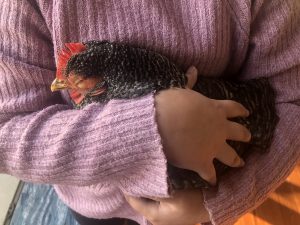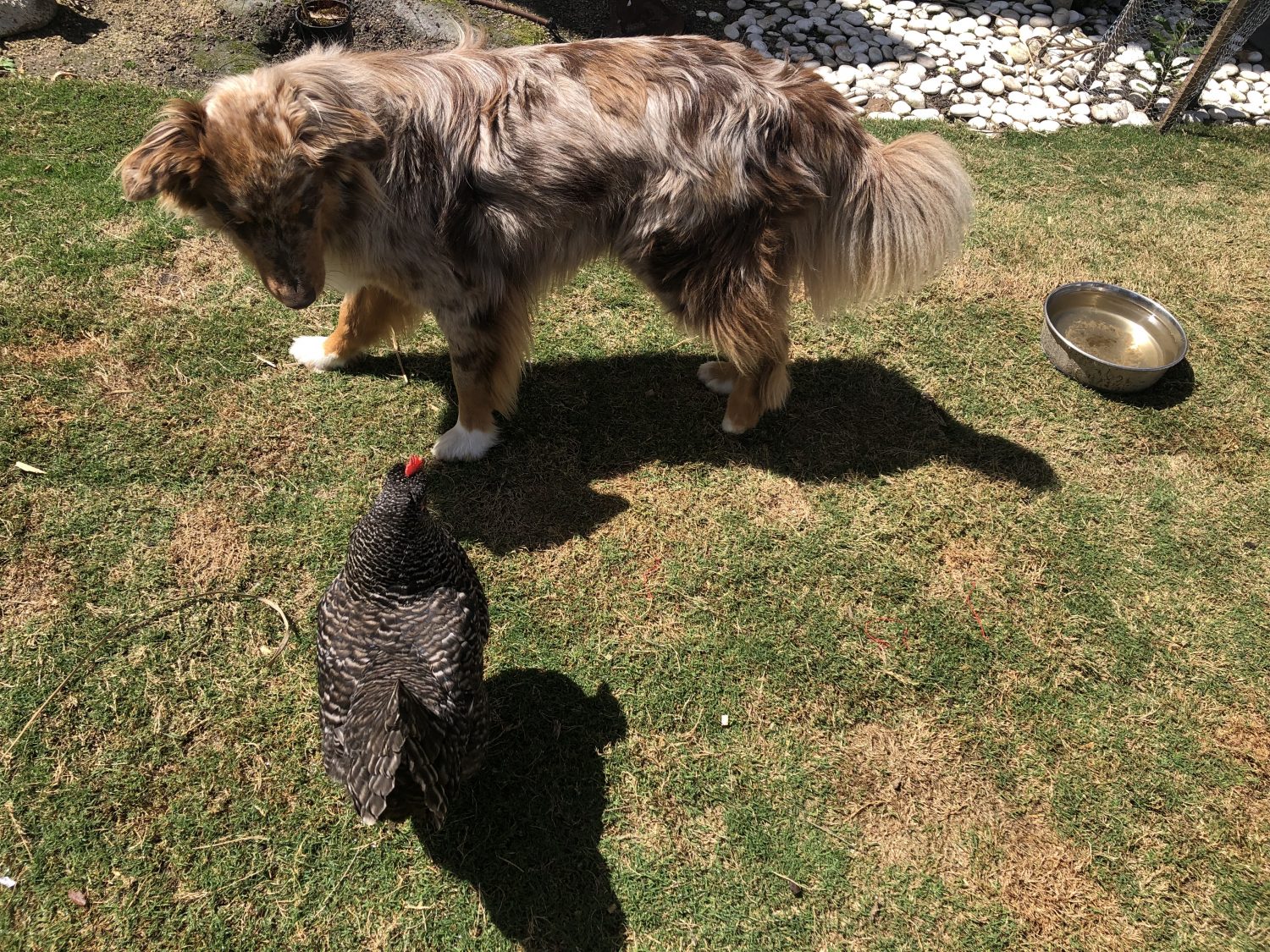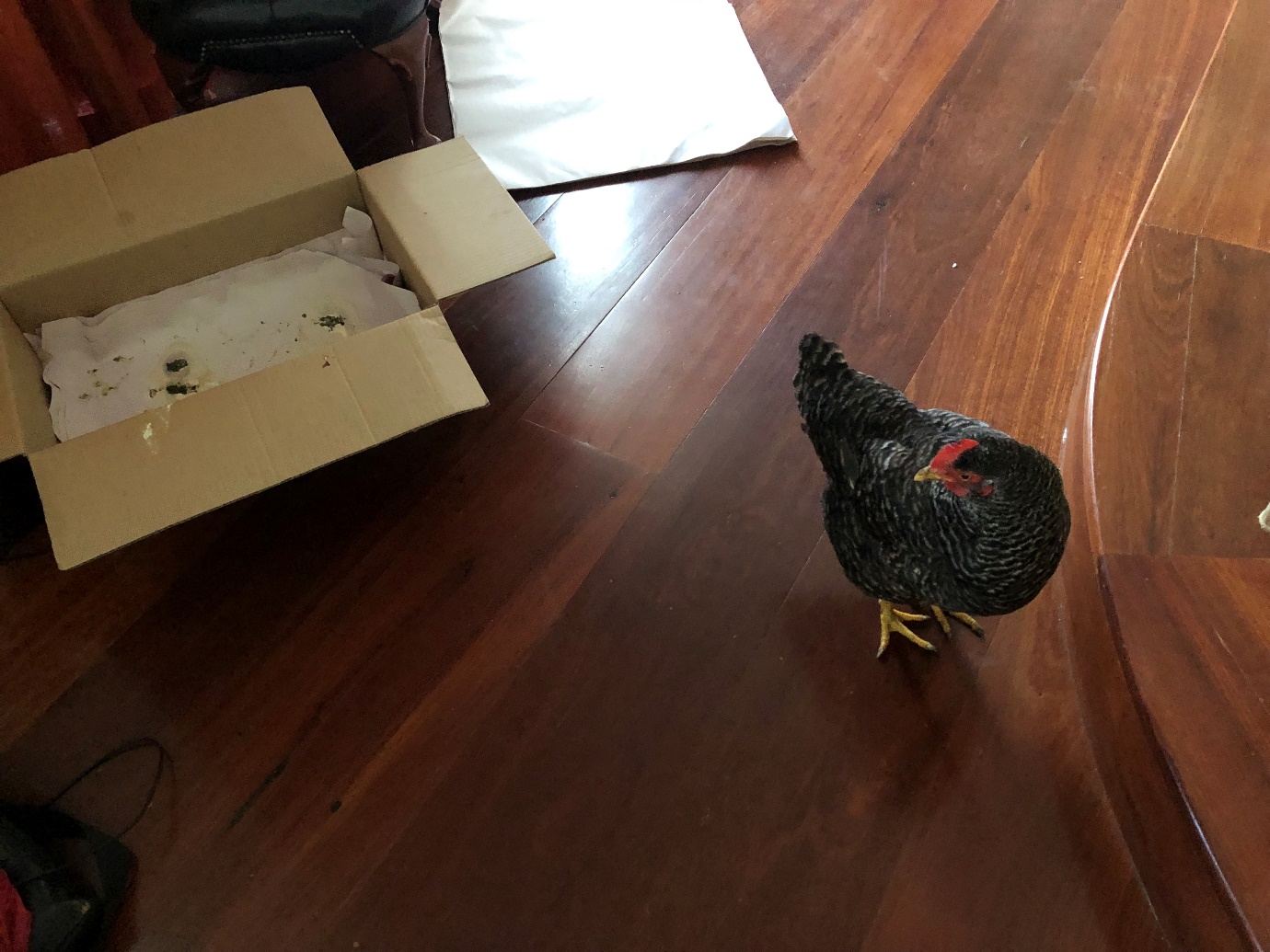I walked to the coop like usual that morning, with my small bucket of food. A mix of scraps and a few pieces of bread. And as usual, two chickens ran to their breakfast. But where was number three?
There she was, sitting under the fronds of a palm, eyes closed. Laying an egg? Odd, but maybe. I came inside and mentioned it to my son. “I don’t know if one of the chickens is sick or laying an egg”. He promptly went to check and reported back, “Sick. I tried to move her and nothing happened”. In that case, gravely unwell.
That morning, I was confused, what to do with a sick chicken? Some years back this happened, and I had to put that chicken down – myself. Not a good day. My decision was forced when later, whilst I was standing in my bedroom, three children walked in, one with the chicken in her arms “we must take her to the vet Dad. Bee’s really sick”. That was her name, Bee. She was really sick.

Bee – one very sick chicken
I said what I thought, that in all my experience with trying to help sick birds get better, they always died. Always. Most recently, I remembered “Drew” that Magpie I picked up off the side of the road whilst driving to Drouin. He died within 24 hours of introducing him to the family. And countless others. But the kids were persistent and they knew I was sitting on the fence.
Half an hour later, we were sitting in the Animal Emergency Department, waiting for the vet. Originally, they offered us to go somewhere more specialised for birds, but that was closing. So, here we were, watching dogs and cats wander in and out.
They took Bee away, behind the doors, and some hours later the vet emerged and gave us his sombre verdict. “I don’t know what’s wrong with her, she’s got a fever so she may have an infection. Give her antibiotics and anti-inflammatories and hope for the best. I think she’s got a 10-20% chance of making it, but too early to put her down.” Okay. 3 hours and $392 dollars later we were heading back home.
That night we gave Bee the first dose of her antibiotic, Augmentin. And this is where our story begins.
For the very first time in my life, this stubborn bird actually looked a bit better the next morning. Her cheeks were less warm, her posture less grave. Only a flicker of hope, perhaps we were at 15%.
Feeding her was tricky at first, then became more straightforward. On day 1, I mixed up some Weetbix, malt, half a crushed kid’s chewable vitamin tablet, sugar and water. It was squishy enough to suck up in a syringe and squirt down her throat. That was her diet for the first two days. We’d wash her face and eyes daily. To keep a good check on her, and keep her warm, she stayed in a box in my bedroom. My wife found that out coming home at midnight after work and nearly tripping over her! What’s that saying again? Better to be told off than ask for permission! We had trialled the kids’ room, but just a bit too much attention there. At any rate, now living inside the forbidden land of the human coop, Bee knew she was loved and very special. Animals know.
Over the coming days, her chances kept improving. We upgraded her diet from Weetbix to bread, to date loaf – date loaf? My wife wasn’t too happy about my use of that one. But Bee loved it! Opening her mouth and pushing the food down her throat with an index finger. Great teamwork – the kids, Bee and me. Gradually, from being quite catatonic she began to regain the sort of things a chicken would ordinarily do. To see her open her eyes again for the first time, we clapped. To watch her flap her wings or stretch, we sighed, and to hear familiar “poc poc poc” was like a merry jig, returned.
Eventually one afternoon, we let her back out on the lawn. The dogs came out to inspect their feathered frenemy. Lo and behold, Bee puffed her chest out, and with drumsticks high ran towards them, scaring them off as usual. Wow – instinct alright!

After nearly one week of recooperation, Bee was drinking for herself, eyes open sometimes, closed others. Still hand fed and still living in my bedroom. At this point, my wife began to ask me questions like, “So how much longer will the chicken be here?” Fair enough, Bee was getting loud, shuffling lots at night, and looking like she may well jump out of her box potentially pooping indiscriminately on our doona. Not a good thought.
By this stage, I must say, that I too was getting carer’s fatigue. The kids had been very good, helping heaps along the way. However, often, I’d find myself needing to tend to her before I could leave for work, and I wondered about when she’d start eating for herself. Her progress, though present, was slow. With her eyes still closed, Bee seemed oblivious to my creeping frustration.
In cleaning her, we also discovered she had a cut above one eye. Perhaps that’s how she got sick in the first place. In the meantime, it was clear that Bee loved all the attention. We started to have our suspicions that she loved it so much, that she may have been faking things even these days.
And so it happened that one day, sometime just after a week, I came into my bedroom to find Bee standing outside her box having just done a big poop on the floorboards. Alack and alas and hooray, it was time to return to the coop.
She’s still not fully right, but seems to be improving every day. One sister does occasionally bully her, I suppose that’s what you call the pecking order after all, but we all agree that she’s happy to be back where she belongs.
I still can’t believe she’s alive. Not bad for a 10-20% chance. Thanks kids, for once again proving me wrong. Thanks Nat, for letting a chicken live in our bedroom for over a week. Thanks life, for showing me that it’s always worthwhile trying because you don’t know exactly where luck falls, one day to the next. And finally, thanks Bee, for being such a good patient and one lucky chook!
If there are any lessons to find in this story, I’ll leave it up to you. From my part, I can say, chickens sure do have big hearts and even bigger mouths!





